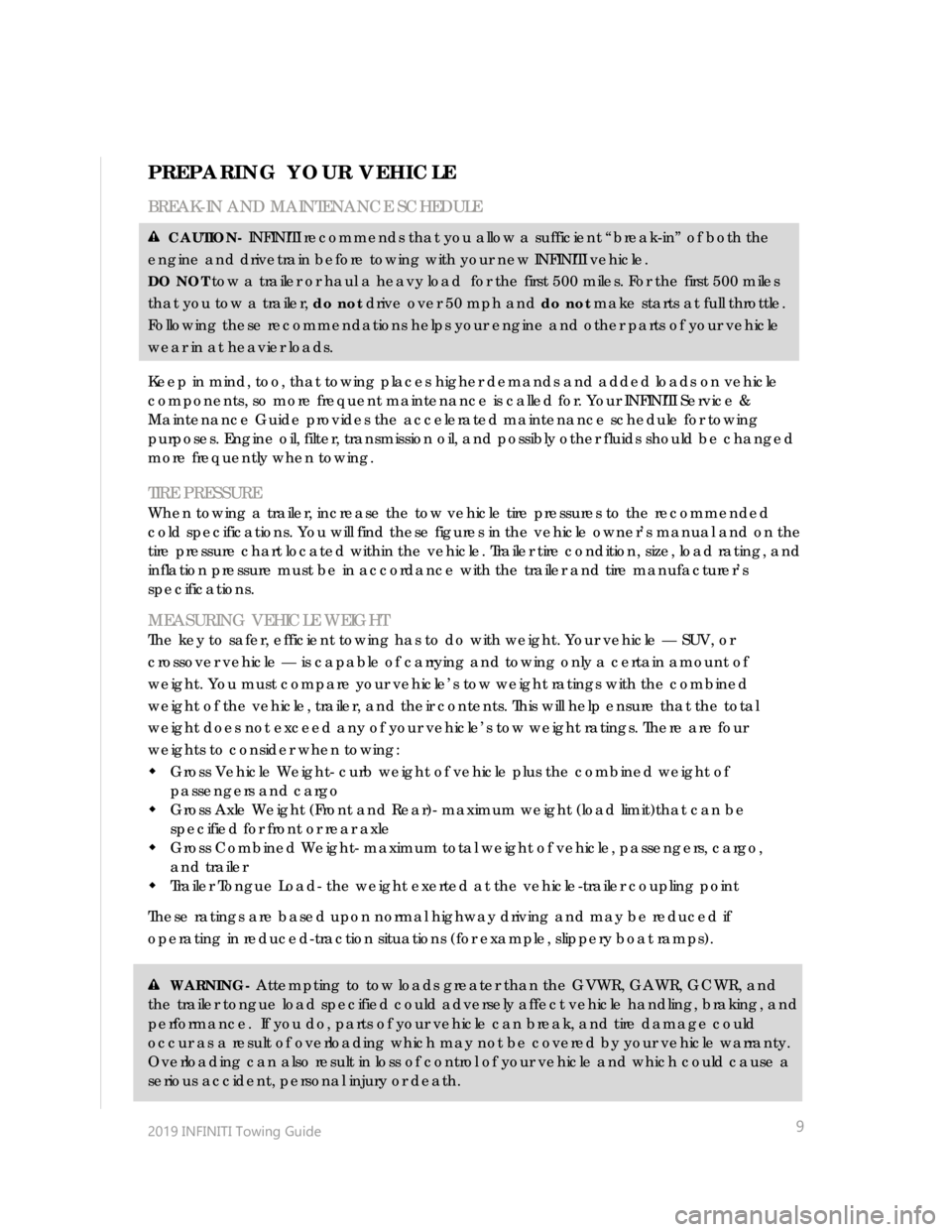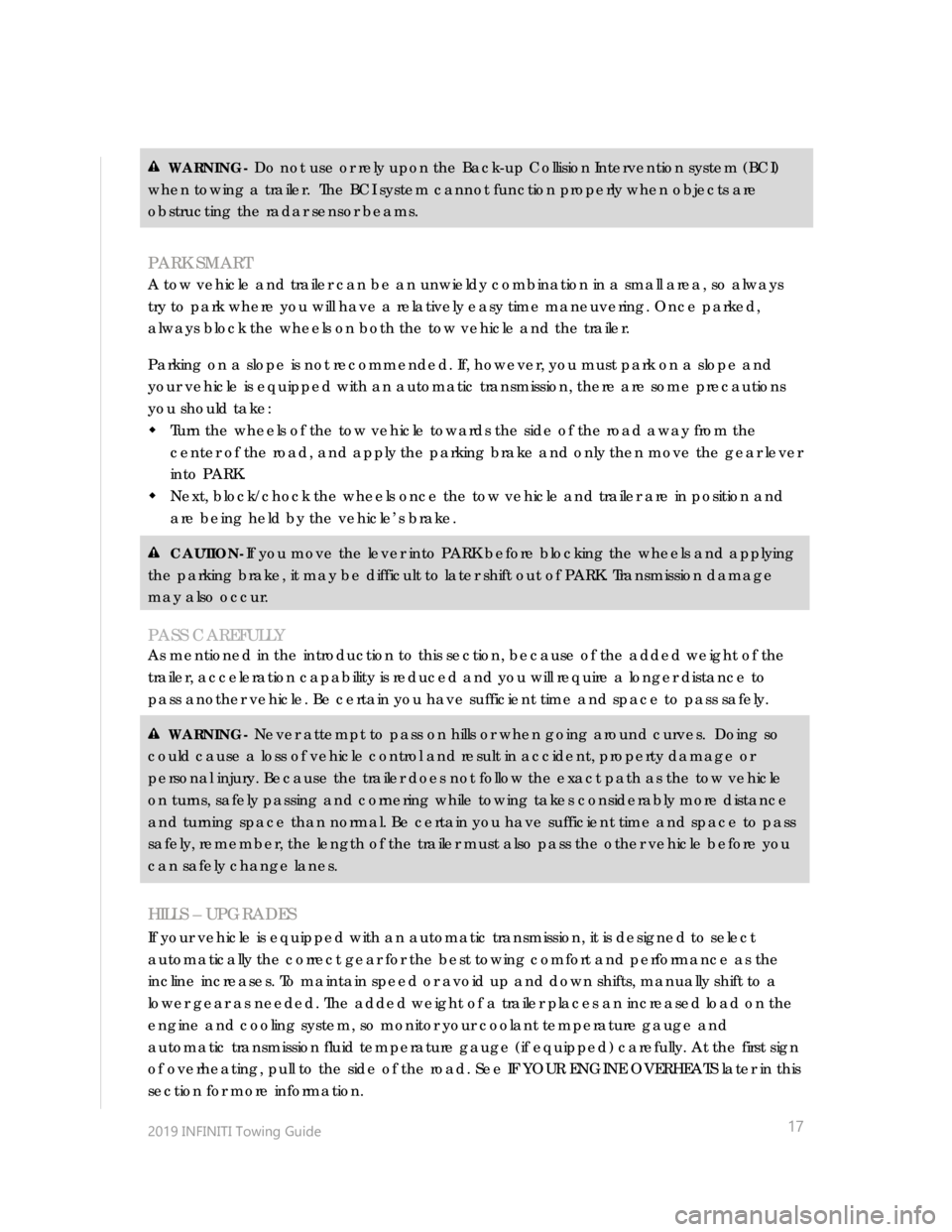transmission fluid INFINITI Q70 2019 Towing Guide
[x] Cancel search | Manufacturer: INFINITI, Model Year: 2019, Model line: Q70, Model: INFINITI Q70 2019Pages: 25, PDF Size: 0.38 MB
Page 10 of 25

2019 INFINITI Towing Guide
9
PREPARING YOUR VEHICLE
BREAK-IN AND MAINTENANCE SCHEDULE
CAUTION- INFINITI recommends that you allow a sufficient “break-in” of both the
engine and drivetrain before towing with your new INFINITI vehicle.
DO NOT tow a trailer or haul a heavy load for the first 500 miles. For the first 500 miles
that you tow a trailer, do not drive over 50 mph and do not make starts at full throttle.
Following these recommendations helps your engine and other parts of your vehicle
wear in at heavier loads.
Keep in mind, too, that towing places higher demands and added loads on vehicle
components, so more frequent maintenance is called for. Your INFINITI Service &
Maintenance Guide provides the accelerated maintenance schedule for towing
purposes. Engine oil, filter, transmission oil, and possibly other fluids should be changed
more frequently when towing.
TIRE PRESSURE
When towing a trailer, increase the tow vehicle tire pressures to the recommended
cold specifications. You will find these figures in the vehicle owner’s manual and on the
tire pressure chart located within the vehicle. Trailer tire condition, size, load rating, and
inflation pressure must be in accordance with the trailer and tire manufacturer’s
specifications.
MEASURING VEHICLE WEIGHT
The key to safer, efficient towing has to do with weight. Your vehicle — SUV, or
crossover vehicle — is capable of carrying and towing only a certain amount of
weight. You must compare your vehicle’s tow weight ratings with the combined
weight of the vehicle, trailer, and their contents. This will help ensure that the total
weight does not exceed any of your vehicle’s tow weight ratings. There are four
weights to consider when towing:
Gross Vehicle Weight- curb weight of vehicle plus the combined weight of
passengers and cargo
Gross Axle Weight (Front and Rear)- maximum weight (load limit)that can be
specified for front or rear axle
Gross Combined Weight- maximum total weight of vehicle, passengers, cargo,
and trailer
Trailer Tongue Load- the weight exerted at the vehicle-trailer coupling point
These ratings are based upon normal highway driving and may be reduced if
operating in reduced-traction situations (for example, slippery boat ramps).
WARNING- Attempting to tow loads greater than the GVWR, GAWR, GCWR, and
the trailer tongue load specified could adversely affect vehicle handling, braking, and
performance. If you do, parts of your vehicle can break, and tire damage could
occur as a result of overloading which may not be covered by your vehicle warranty.
Overloading can also result in loss of control of your vehicle and which could cause a
serious accident, personal injury or death.
Page 18 of 25

2019 INFINITI Towing Guide
17
WARNING- Do not use or rely upon the Back-up Collision Intervention system (BCI)
when towing a trailer. The BCI system cannot function properly when objects are
obstructing the radar sensor beams.
PARK SMART
A tow vehicle and trailer can be an unwieldy combination in a small area, so always
try to park where you will have a relatively easy time maneuvering. Once parked,
always block the wheels on both the tow vehicle and the trailer.
Parking on a slope is not recommended. If, however, you must park on a slope and
your vehicle is equipped with an automatic transmission, there are some precautions
you should take:
Turn the wheels of the tow vehicle towards the side of the road away from the
center of the road, and apply the parking brake and only then move the gear lever
into PARK.
Next, block/chock the wheels once the tow vehicle and trailer are in position and
are being held by the vehicle’s brake.
CAUTION-If you move the lever into PARK before blocking the wheels and applying
the parking brake, it may be difficult to later shift out of PARK. Transmission damage
may also occur.
PASS CAREFULLY
As mentioned in the introduction to this section, because of the added weight of the
trailer, acceleration capability is reduced and you will require a longer distance to
pass another vehicle. Be certain you have sufficient time and space to pass safely.
WARNING- Never attempt to pass on hills or when going around curves. Doing so
could cause a loss of vehicle control and result in accident, property damage or
personal injury. Because the trailer does not follow the exact path as the tow vehicle
on turns, safely passing and cornering while towing takes considerably more distance
and turning space than normal. Be certain you have sufficient time and space to pass
safely, remember, the length of the trailer must also pass the other vehicle before you
can safely change lanes.
HILLS – UPGRADES
If your vehicle is equipped with an automatic transmission, it is designed to select
automatically the correct gear for the best towing comfort and performance as the
incline increases. To maintain speed or avoid up and down shifts, manually shift to a
lower gear as needed. The added weight of a trailer places an increased load on the
engine and cooling system, so monitor your coolant temperature gauge and
automatic transmission fluid temperature gauge (if equipped) carefully. At the first sign
of overheating, pull to the side of the road. See IF YOUR ENGINE OVERHEATS later in this
section for more information.